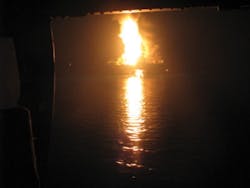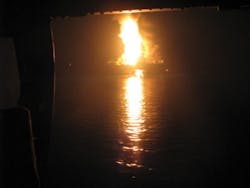Insurance lessons from the deepwater
Response crews battle the blazing remnants of the Deepwater Horizon April 21, 2010. Photo courtesy of the US Coast Guard.
Linda Kornfeld, Dickstein Shapiro LLP, Los Angeles
Selena Linde, Dickstein Shapiro LLP, Washington, DC
The unprecedented gush of oil into the Gulf of Mexico waters after the Deepwater Horizon explosion in April 2010 caused worldwide businesses to contemplate the implications of the likely and massive litigation and potential serious economic losses that they might suffer because of the spill. Fortunately, for many businesses, the anticipated losses did not occur. However, the event led to concern about future events and their potential impact.
Part of the dialogue last year in considering how businesses may address financial hardship because of the Gulf oil spill centered on the availability of insurance. In fact, policyholders and insurers alike expected massive coverage litigation and in doing so considered the relevant coverage issues that would be addressed and resolved in that litigation.
Should the oil and gas industry suffer another event similar in manner or degree, insurance will be a critical resource. Insurance issues should be considered early and often whether as a result of a significant environmental event that causes businesses to become defendants in litigation due to an environmental event or as a result of economic losses incurred during a government-imposed drilling moratorium (as happened after the Deepwater Horizon explosion) or due to other events that interfere with normal business operations.
Commercial general liability (CGL) and business interruption insurance may offer a critical first line of assistance in responding to litigation or other business losses. In the context of similar types of large-scale losses, insurers have often responded with a host of arguments to avoid paying policyholders' claims.
Whether policyholders can defeat these arguments will depend on the particular facts involved and the applicable policy language. Regardless, policyholders never should accept an insurer's denial of coverage as having merit, but instead should always consult with outside coverage counsel to determine independently the merits of the claim. Here we focus on certain notable insurer arguments.
Economic losses
Plaintiffs in a number of lawsuits filed in connection with the Gulf oil spill alleged that the spill resulted in "catastrophic environmental destruction," which has caused the plaintiffs to suffer "economic loss." Policyholders can expect some insurers to argue against coverage for such allegations by claiming that economic losses do not constitute direct "bodily injuries" or "property damage" under CGL policies.
Policyholders should reject this argument. CGL policies typically cover "those sums that the insured becomes legally obligated to pay as damages because of ‘bodily injury' or ‘property damage' to which this insurance applies . . ." and generally do not expressly exclude "economic losses."
Courts addressing the economic loss question have focused on the "because of" policy language and found coverage when the damages sought are "because of" bodily injury or property damage. According to those courts, as long as the claimed economic losses naturally flow from property damage or bodily injury, coverage should apply.
In the context of litigation similar to that filed in response to the Deepwater Horizon disaster, coverage should not be impacted simply because some plaintiffs do not claim damage to their own property, but, instead, claim economic loss resulting from damage to other property, such as wetlands. A causal connection between damaged property and lost profits may overcome insurer economic loss defenses.
Pollution exclusion
Many insurers may cite pollution exclusions in both CGL and first-party policies to defend against coverage for oil spill losses and litigation or similar catastrophic environmental events.
However, these exclusions do not bar coverage for all pollution-related claims. For example, although pollution exclusions often include broad definitions of "pollutant," many courts have narrowed the applicability of the exclusion to "traditional" environmental contaminants. Thus, in connection with the Gulf oil spill, policyholders could have sought to avoid application of pollution exclusions by arguing that it does not apply to losses resulting from for example the release of "unrefined" oil or the use of chemical dispersants in the clean-up effort.
The exclusion also often does not apply to product liability claims. Some Gulf oil spill plaintiffs have alleged injury because of the use of chemical dispersants. Companies that manufactured or sold these dispersants could argue in favor of coverage by alleging that the claims against them are for product liability claims that fall outside the pollution exclusion.
The "cause" of the catastrophic event also may provide an avenue to avoid this exclusion. For example, with respect to the Gulf oil spill, the cause of the loss at issue may not have been the release of a pollutant, but rather the fire and explosion at the Deepwater Horizon.
Fire and explosion are covered causes of loss under many CGL and first-party policies. Thus, policyholders could argue that the loss resulted from a covered cause of loss as opposed to one that is excluded. The success of this argument will depend on the state causation law that ultimately may apply and the specific wording of the insurance policy provisions.
Nuisance claims
Many of the suits that arose from the Deepwater Horizon oil spill included "nuisance" claims.
There are two types of nuisance claims, private and public, both of which were employed in the Gulf oil spill litigation.
The typical remedy sought for a nuisance claim is not compensatory damages, but the "abatement" of the nuisance. In the past, some insurers have argued that suits seeking abatement are not covered by their policies. These insurers rely on CGL policy language requiring the insurers to pay "those sums that the insured becomes legally obligated to pay as damages . . ." According to the insurers, the term "damages" is limited to "legal" monetary damages, and because abatement is an equitable remedy, the nuisance claims are not covered.
In the context of oil spill-related suits insurers may raise a similar argument. However, in the environmental context courts generally have rejected attempts by insurers to draw a distinction between legal and equitable relief. These courts recognize that regardless whether the relief is styled as damages, abatement, or other injunctive relief, it still requires the policyholder to pay money because of harm caused to third-parties.
Moratoriums on drilling
After the Deepwater Horizon explosion, President Obama issued a temporary moratorium on drilling in the Gulf waters. Any event that interferes with the ability of a business to conduct its normal business activities can result in substantial lost profits. Many companies in the oil and gas industry contain some form of "business interruption" insurance in their insurance portfolio. The policy language in these policies can vary, sometimes widely, with respect to the type of event that is necessary to trigger coverage to pay for lost profits. Frequently these policies require actual damage to the policyholder's property that results in an "interruption" of business.
However, most companies that suffered loss because of the drilling moratorium did not themselves suffer any actual damage to their property because of the Deepwater Horizon explosion. Given the language in many policy forms that fact should not matter. Indeed, many business interruption policies pay for lost profits when a business cannot perform its normal business activities because of an order of "civil authority." Drilling "moratoriums" generally should fall within this "civil authority" coverage. Thus, policyholders should review their policies to determine the extent to particular policy language will provide adequate protection.
In sum, policyholders have arguments to overcome popular insurer efforts to avoid coverage. It is important to consider the particular damage at issue, and to review the specific terms of the individual policy to determine which coverage issues may arise and which arguments will be the most effective.
About the authors
More Oil & Gas Financial Journal Current Issue Articles
More Oil & Gas Financial Journal Archives Issue Articles
View Oil and Gas Articles on PennEnergy.com


